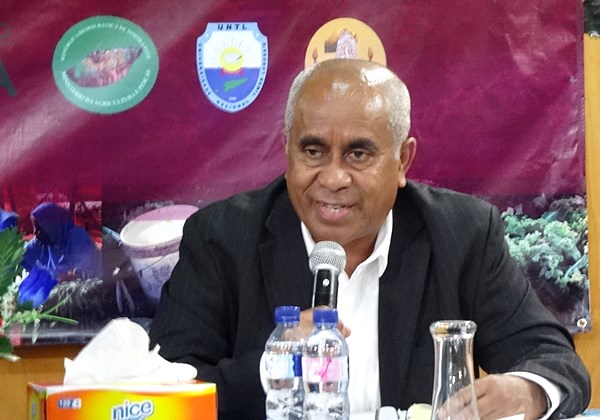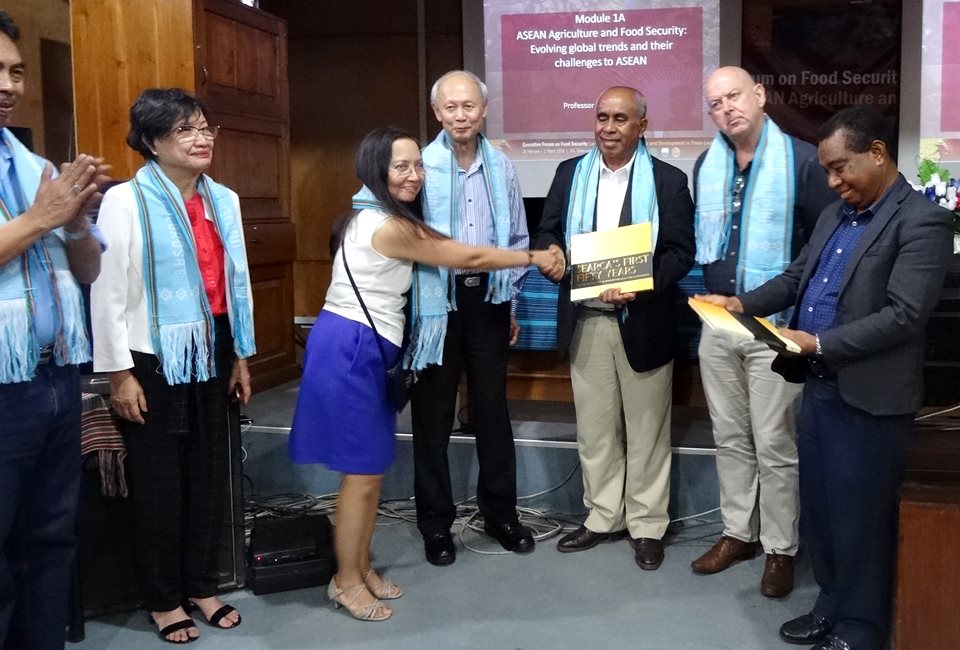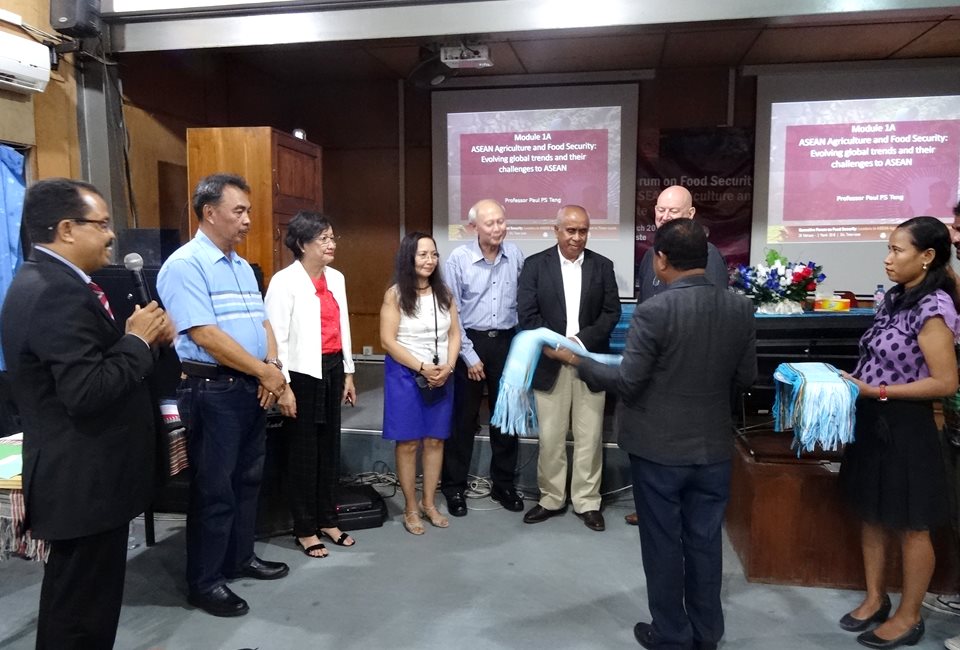The forum participants included middle managers and senior leaders in 12 national agriculture, fisheries, and rural development agencies, nongovernment organizations (NGOs), and key faculty members and officials of higher education institutions (HEIs) in agriculture and related fields. The forum, which runs until 2 March 2018, is organized by the Southeast Asian Regional Center for Graduate Study and Research in Agriculture (SEARCA), with the Universidade Nacional Timor Lorosaae (UNTL), Ministry of Agriculture and Fisheries (MAF), and the SEARCA Alumni Association of Timor-Leste (SAAT) as hosts and co-organizers.

Minister da Silva cited several problems in agricultural and rural development in Timor-Leste. Government investment in agriculture has been small and thus, more investment is needed in agriculture focused on food production. Almost half of the country's population is young and the challenge is how to entice these young people to go into agriculture and farming, and make them see agriculture as an enterprise. The key is to provide them with knowledge and opportunities in agriculture. In terms of policy, Timor-Leste has put in place an agriculture and food security policy but a concrete plan to tackle nutrition deficiency is still lacking.
The government, Minister da Silva said, is now working on establishing irrigation systems across the country to improve food production, especially on increasing rice harvests. It also launched programs on crop protection, maize production, livestock improvement, and tilapia aquaculture. The primary need at present, he said, is the provision of training and technical assistance to farmers. He noted that the forum on food security is one step to improving the knowledge of the participants, who work with the farmers in the country. He thanked SEARCA, UNTL, and SAAT for their hard work in ensuring that the forum will be organized and implemented smoothly in his country.
In his welcome remarks during the opening program, Dr. Francisco Miguel Martins, UNTL Rector, lauded the efforts made by the teams from SEARCA and UNTL to organize the forum, which promotes the sharing of knowledge and points of view on agriculture and development, food security, and climate change. These topics, he said, are also the focus of the only public university of agriculture in Timor-Leste, which is UNTL.
Dr. Martins noted that cooperation has been one of UNTL's main directions, demonstrated through the implementation of numerous national and international initiatives, in accordance with the University's strategic plan. He said that such variety of collaborative linkages aim at promoting partnerships towards capacity building among the university's students, faculty members, and administrative staff, with the overall objective of ensuring high quality public higher education, and joint research and scientific production in areas that have been identified as strategic for the university.
He further stated that UNTL and SEARCA signed a Memorandum of Understanding (MOU) in November 2015 to promote cooperation initiatives in agriculture and development, such as this executive forum. He expressed UNTL's appreciation of SEARCA's assistance, which began even before the MOU has been signed, through the continuous support given to the lecturers of the UNTL's Faculty of Agriculture, not only through the provision of graduate degree scholarships but through joint research projects as well. Collaborative activities between UNTL and SEARCA, he stressed, actively promote human capital development, which is essential for the stable and sustainable development of Timor-Leste. Investment in human capital, he further emphasized, is crucial to accelerate and diversify the economy of the country, so it can become less dependent on oil and gas and that by 2030, Timor-Leste can become a "medium-high income country, as set out in the Strategic National Development Plan."
Dr. Gil C. Saguiguit, Jr., SEARCA Director represented by Dr. Maria Celeste H. Cadiz, Program Head for Knowledge Management, said that pathways toward food security are constantly faced by challenges of an ever-increasing population, dwindling natural resource base, and worsening climatic conditions that negatively affect the region's agriculture sector. These challenges, he said, demand leaders and executives like the participants to rise above the occasion and make appropriate multilateral decisions and actions. Thus, he emphasized that the goal of the forum is to develop a cadre of highly competent leaders who are poised to spur agricultural development in Timor-Leste through their respective programs and organizations.
Dr. Saguiguit elaborated that this offering is one of SEARCA's staple learning events offered in its current 10th Five-Year Plan focusing on Inclusive and Sustainable Agricultural and Rural Development (ISARD). "At the end of this plan that is already in its fourth year, SEARCA hopes to have contributed to food and nutrition security in the SEAMEO-member countries through graduate scholarship and institutional development assistance, research and development, nonformal capacity building programs and activities, and knowledge management," he said.
He added that the forum is part of the offerings of SEARCA's Short Term Training Program under Knowledge Management. It has been tailored from what SEARCA has been offering since 2013 as a regional course according to Timor-Leste's specific context and needs. He expressed appreciation of the partnership with MAF, UNTL, and SAAT in co-organizing and hosting the forum.
The specially-tailored forum for Timor-Leste is led by Dr. Paul S. Teng, a SEARCA Senior Fellow and Managing Director of the National Institute of Education International Pte. Ltd with the Nanyang Technological University in Singapore.
Aside from Dr. Teng, the team of resource persons include Dr. Andrew D. Powell, CEO of Asia Biobusiness based in Singapore; Dr. Nerlita M. Manalili, CEO of Nexus Agribusiness Solutions based in the Philippines; Engr. Samuel M. Contreras, Head for Soil Conservation at the Bureau of Soils and Water Management, Philippine Department of Agriculture; and Mr. Adao Soares Barbosa, UNFCC Focal Point and Director of Climate Change and Biodiversity at UNTL.
Forum management is provided by Dr. Cadiz and Ms. Nova A. Ramos, SEARCA Program Specialist; with UNTL counterparts led by Dr. Eduardo Aniceto Serrão, Vice Rector for International Cooperation and Ms. Ilona Hamilton, Assistant to the Vice Rector; and SAAT counterpart led by its President Mr. Agustinho da Costa Ximenes, Agriculture Program Manager, Catholic Relief Services. (NARamos)


